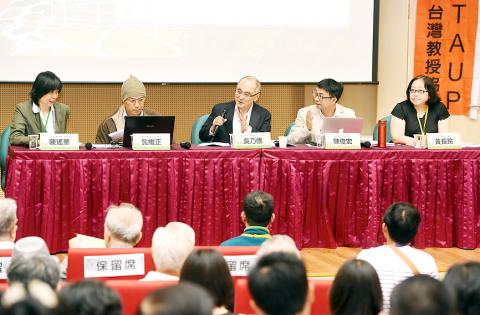At a time when “transitional justice” is on everyone’s lips, Taiwan faces the questions of not only how it should be achieved, but also how “historical truth” should be received, academics said in Taipei yesterday.
In the first day of a two-day Taiwan Association of University Professors symposium titled “Transitional Justice and Law,” academics exchanged views on how transitional justice should be defined and applied.
On a theoretical level, they said that when the definition of transitional justice is over-inclusive, the term becomes meaningless.

Photo: Liao Chen-huei, Taipei Times
“It has to be recognized as a normative concept, with a contextual background in which what needs to be redressed, through certain measures and projects, is systematic or institutional violence and human rights violations perpetrated in the past,” Soochow University philosophy professor Chen Jau-hwa (陳瑤華) said.
“Truth, justice, reparations and guarantees of non-recurrence are four criteria of transitional justice, and the strategies must be holistic — as expounded in a UN report — incorporating integrated attention to individual prosecutions, reparations, truth-seeking, institutional reform, vetting and dismissals, or an appropriately conceived combination thereof,” Huafan University assistant professor of philosophy Kung Wei-cheng (龔維正) said.
While Chen and Kung broadly defined transitional justice as the handling of past institutional violations of human rights, Soochow University political science professor Chen Chun-hung (陳俊宏) said that not every human rights violation should be addressed in the name of transitional justice.
“The mechanisms dealing with transitional justice, such as establishing a truth committee, reparations and institutional reforms, are linked to a particular ‘transitional moment,’ which is why they are different from the standards and operations of ordinary justice,” he said. “I am not saying that past rights violations targeting homosexuals and Aborigines, for instance, are not to be redressed, but what they really need is a standing human rights committee” to deal with a nation’s overall structural injustice.”
On the practical level, Kung said Taiwan has so far only provided financial compensation to people affected by the 228 Incident and the White Terror era, but “the right to reparations should include measures of social and psychological rehabilitation of the victims and should be accompanied by the right to truth and justice,” he said, citing the Review of the Initial Reports of the Government of Taiwan on the Implementation of the International Human Rights Covenants, which was published in 2013.
Impunity is the greatest obstruction to transitional justice, and Article 9 of the National Security Act (國家安全法), which forbids cases tried by military judicial authorities during the Martial Law period being subject to appeal or retrial in a civil court, “amounts to an amnesty for those who committed human rights violations during the White Terror era,” Kung said.
Chinese Culture University professor of law Cheng Wen-chung (鄭文中) said that in the case of government-sponsored crime, ordinary statutes of limitation requirements should not apply, because “the very reason a government exists is to protect its people.”
Forum participants said that prosecution of human rights offenders would be key to any new transitional justice efforts.
“The core of transitional justice is determining who the wrongdoers are, because only then can you begin to point out what actions are right or wrong,” Youth Synergy Taiwan Foundation researcher Lin Long-shen (林雍昇) said, adding that any transitional justice that did not punish wrongdoing would be “hypocritical” and would only have limited effectiveness.
National Chengchi University Graduate Institute of Taiwan History director Hsueh Hua-yuan (薛化元) said that focusing solely on ostensible political cases would not exhaust what needs to be redressed concerning human rights violations during the former Chinese Nationalist Party (KMT) authoritarian regime.
He raised examples of bankruptcy and accusations of embezzlement, which he said were — according to the oral history — contrary to their economic appearances, political in essence and were selectively persecuted or convicted due to the fact that accused companies had upset then-president Chiang Ching-kuo (蔣經國), either by secretly aiding liberal-leaning magazines or attempting to coordinate a nationwide network of local politicians.
Hsueh called into question the redaction of files made possible by regulations governing the privacy of personal information.
However, National Taiwan University associate professor of political science Huang Chang-ling (黃長玲) said that a complete opening of political files carried the risk of turning what should be an operation for justice into a re-perpetration of human rights breaches.
Additional reporting by Abraham Gerber

Actor Darren Wang (王大陸) was questioned by prosecutors for allegedly orchestrating an attack on a taxi driver after he was allegedly driven on a longer than necessary route in a car he disliked. The questioning at the New Taipei City District Prosecutors’ Office was ongoing as of press time last night. Police have recommended charges of attempted murder. The legally embattled actor — known for his role in the coming-of-age film Our Times (我的少女時代) — is under a separate investigation for allegedly using fake medical documents to evade mandatory military service. According to local media reports, police said Wang earlier last year ordered a

A man in Tainan has been cleared on charges of public insult after giving the middle finger during a road rage incident, as judges deemed the gesture was made “briefly to express negative feelings.” In last week’s ruling at the High Court’s Tainan branch, judges acquitted a driver, surnamed Cheng (程), for an incident along Tainan’s Nanmen Road in September 2023, when Cheng had spotted a place to park his car in an adjacent lane. Cheng slowed down his vehicle to go into reverse, to back into the parking spot, but the car behind followed too closely, as its driver thought Cheng

CAUTION: Based on intelligence from the nation’s security agencies, MOFA has cautioned Taiwanese travelers about heightened safety risks in China-friendly countries The Ministry of Foreign Affairs (MOFA) yesterday urged Taiwanese to be aware of their safety when traveling abroad, especially in countries that are friendly to China. China in June last year issued 22 guidelines that allow its courts to try in absentia and sentence to death so-called “diehard” Taiwanese independence activists, even though Chinese courts have no jurisdiction in Taiwan. Late last month, a senior Chinese official gave closed-door instructions to state security units to implement the guidelines in countries friendly to China, a government memo and a senior Taiwan security official said, based on information gathered by Taiwan’s intelligence agency. The

President William Lai (賴清德) should protect Taiwan Semiconductor Manufacturing Co (TSMC), and stop supporting domestic strife and discord, former president Ma Ying-jeou (馬英九) wrote on Facebook yesterday. US President Donald Trump and TSMC on Monday jointly announced that the company would invest an additional US$100 billion over the next few years to expand its semiconductor manufacturing operations in the US. The TSMC plans have promoted concern in Taiwan that it would effectively lead to the chipmaking giant becoming Americanized. The Lai administration lacks tangible policies to address concerns that Taiwan might follow in Ukraine’s footsteps, Ma wrote. Instead, it seems to think it could